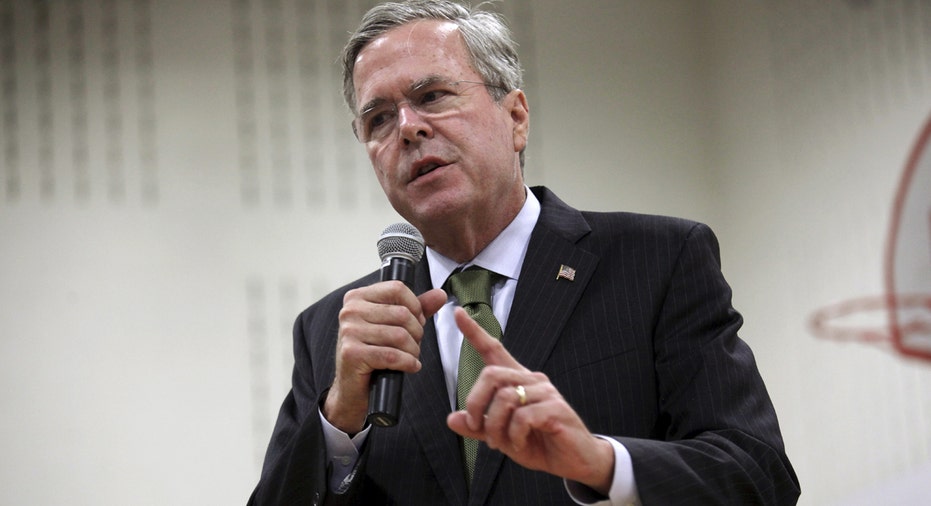Hank Greenberg Gives $10M to Super PAC Backing Jeb Bush

Maurice R. "Hank" Greenberg, who built American International Group Inc. into a world-wide financial powerhouse before its controversial government bailout, has donated $10 million to the super PAC backing Republican presidential candidate Jeb Bush, making him one of the largest contributors in the 2016 race. Mr. Greenberg joins the ranks of a handful of supersize donors. A group of super PACs backing Texas Sen. Ted Cruz has collected some of the largest checks of the election from donors including the Wilks family of fracking billionaires ($15 million), hedge-fund manager Robert Mercer ($11 million) and private equity-fund founder Toby Neugebauer ($10 million). Mr. Greenberg's largess, confirmed by people with knowledge of Right to Rise USA's fundraising, becomes another milestone in the unprecedented flow of money in the 2016 election. Still, what is becoming less clear is whether piles of cash can help a candidate win. GOP front-runner Donald Trump has renounced super PACs and didn't begin spending large sums until he aired his first television ads this week. Two former Republican candidates, Wisconsin Gov. Scott Walker and former Texas Gov. Rick Perry, quit the race when their campaign accounts ran dry even as their friendly super PACs still had millions in the bank. Right to Rise USA has spent more than $47 million on advertising, according to a Wall Street Journal review of Federal Election Commission records. That is far more advertising money than any other 2016 entity has spent, yet Mr. Bush is polling in the single digits. In an interview Wednesday, Mr. Greenberg didn't deny he made the contribution but said he wouldn't discuss it. The super PAC isn't required to disclose donations to the FEC for the second half of the year until Jan. 31. "We do not discuss donors or specific donations," said Right to Rise USA spokesman Paul Lindsay. "Our FEC report will be released at the end of the month." Allies of Mr. Bush, the former Florida governor, maintain that money will make a difference in the race, especially in the first half of March when nearly two dozen states will hold nominating contests. "There will be so many states voting, so many delegates up for grabs and that means a lot of media markets to spend money in," said Mississippi-based GOP consultant Austin Barbour. "A lot of voters make up their minds at the last minute, and it you're not on TV, you have no chance." Because of election laws requiring campaigns and super PACS to operate independently, Mr. Barbour, a senior adviser to Mr. Bush's campaign, said he was unaware of Mr. Greenberg's donation to the super PAC, which he called "a really big deal, great news." Campaign-finance watchdogs have a different view of such large super PAC donations. Larry Noble, general counsel for the Campaign Legal Center, described the $10 million contribution to the super PAC as a backdoor way to avoid the $2,700 limit on campaign donations. "Donations like this show the near collapse of the campaign-finance system, since there is a very little difference between giving $10 million to the super PAC and $10 million to the campaign, which would be blatantly illegal," he said. "Jeb Bush owes his super PAC donors the same debt of gratitude as if they had given to the campaign." Before Mr. Bush became an official candidate, he helped the super PAC raise a record-setting $103 million in the first half of 2015, raising expectations potential rivals would be too intimidated to join the race. The ploy didn't work, as more than a dozen candidates crowded the GOP field. Since losing his lead in the polls to Mr. Trump in late July, Mr. Bush has struggled to rebound and keep up the frenetic pace of his early fundraising. Last week, his campaign announced it was canceling $3 million in television advertising in Iowa and South Carolina and dispatching more staffers to the early-voting states to focus on the ground game. Right to Rise USA, bolstered by Mr. Greenberg's yet-to-be announced check, assured supporters that it would be on the air. Mr. Greenberg led AIG from the 1960s until he resigned under pressure in 2005 as then-New York Attorney General Eliot Spitzer was investigating alleged accounting improprieties at AIG. Mr. Greenberg, who denies wrongdoing, faces trial on two remaining civil-fraud charges from that matter in state court, possibly early this year. The government bailout of AIG, which reached nearly $185 billion at its peak, was aimed at avoiding a widening of the global financial crisis in 2008 that nearly pushed AIG into bankruptcy court. A federal judge ruled in June that the government violated the law in some aspects of the bailout but declined to award the $40 billion in damages sought by Mr. Greenberg for thousands of shareholders, including an investment company he oversees. That company and C.V. Starr, where Mr. Greenberg is chairman and chief executive, are part of an insurance and investment conglomerate. Mr. Greenberg's relationship with Mr. Bush dates back to the former governor's second term, when Florida was hit with eight hurricanes in less than two years. As chairman of a private foundation affiliated with AIG, Mr. Greenberg announced a $1 million donation to the relief effort in southwestern Florida following Hurricane Charley in 2004. Rebecca Ballhaus and Leslie Scism contributed to this article. Write to Beth Reinhard at beth.reinhard@wsj.com



















